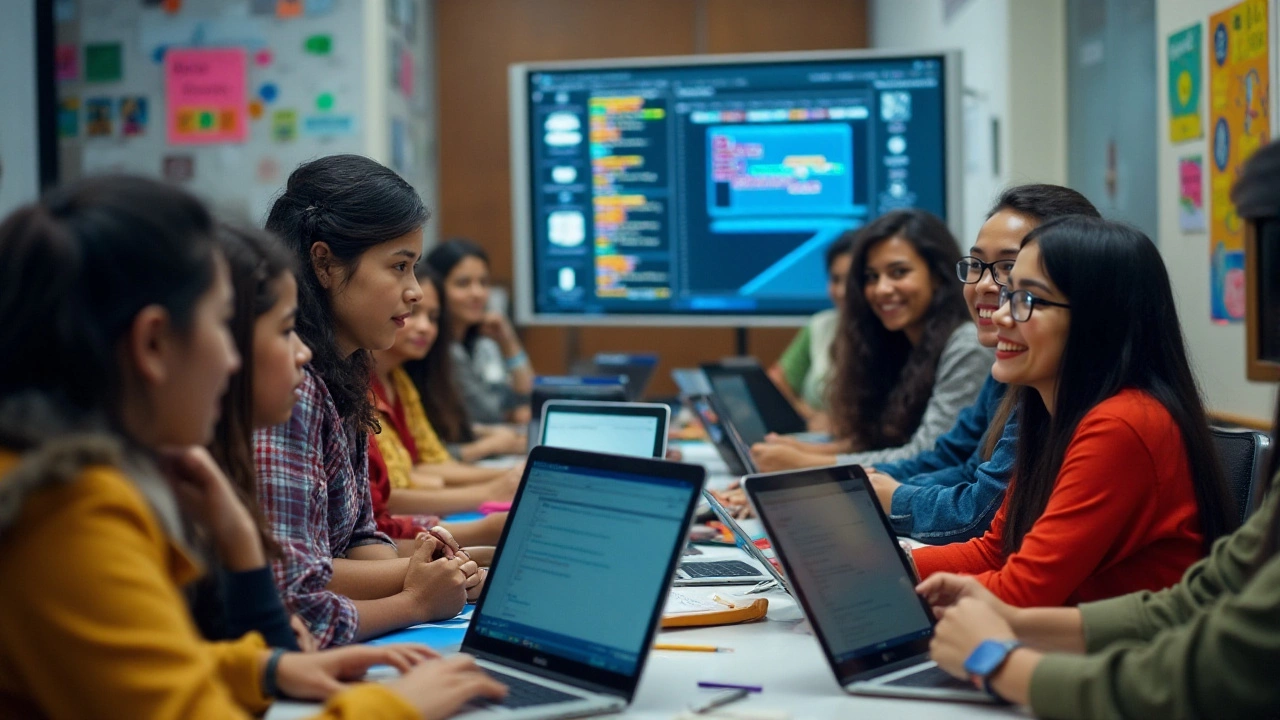Embarking on your journey to learn coding can be a thrilling and rewarding adventure. Whether you're looking to shift careers or simply want to dabble in something new, coding opens up a variety of opportunities worth exploring. The thought of turning ideas into real-world applications is quite magical and learning coding can be a valuable skill in today's digital age.
But where does one start with coding? With countless languages, tools, and resources available, the options could feel overwhelming. The challenge is not just starting but knowing how to effectively navigate the sea of information and stay committed through the process. This introduction will help you set a foundation, focusing on gentle, but effective steps to ease into the world of code.
- Understanding the Basics
- Choosing Your First Programming Language
- Setting Up Your Development Environment
- Finding Learning Resources
- Practicing Through Projects
- Staying Motivated
Understanding the Basics
Diving into the world of coding begins with grasping a few fundamental concepts that lay the foundation for everything you'll need to build upon. At its core, coding is simply writing instructions for a computer to execute. These instructions form what's known as a program, which can perform a wide range of tasks from simple calculations to complex algorithms running global social networks. Understanding this basic principle is vital for any aspiring coder.
The true beauty of coding lies in its universality. Regardless of the specific programming language, all codes follow logic and structure. You're dealing with variables, which are like little boxes that store information for your program to manipulate. There's also the wonderful world of loops that allow you to repeat tasks efficiently, and conditions that help your programs make decisions based on specific criteria. These building blocks are what empower you to create functional and dynamic applications.
A crucial step in learning coding is familiarizing yourself with concepts such as syntax and semantics. Syntax refers to the set of rules that define the combinations of symbols considered correctly structured within a language, much like grammar in human languages. On the other hand, semantics is about what those symbols mean when used together – the logic behind the code's actions. Comprehending these principles will significantly ease the learning process, allowing you to spot and correct errors more quickly.
One must not overlook the significance of algorithms in programming. These are step-by-step procedures or formulas for solving problems and are central to effective code writing. Not all algorithms are created equal; some will solve your problem efficiently, while others may bog down your system. It's about fine-tuning your approach to tackle challenges with agility and precision. A key part of beginning your journey in coding is to establish this kind of problem-solving mindset.
"Learning to write programs stretches your mind, and helps you think better, creates a way of thinking about things that I think is helpful in all domains." – Bill Gates
Another often underestimated element is understanding the development cycle, which involves writing, testing, debugging, and maintaining your code. Coding is not just about writing; it's about iterating, improving, and learning from each test cycle. Bugs and errors are to be expected, and learning to address them is an invaluable skill. Debugging, often perceived as tedious, can actually be one of the most intellectually satisfying parts of programming.
Perhaps the most exciting moment for a beginner is seeing immediate results. Unlike many other disciplines, coding provides a unique feedback loop. You write a line of code, press run, and see what happens. This immediacy is not only motivating but profoundly educational, as it allows you to witness the direct impact of your instructions. Over time, this practical hands-on experience solidifies your understanding and bolsters your confidence as you start coding on your own.
Choosing Your First Programming Language
Choosing the right programming language is like deciding on the first book to read in a vast library. Each programming language has its own syntax, ideals, and community, and this decision will shape your initial coding journey. Many suggest beginning with languages that are both beginner-friendly and relevant in today’s job market. Python often finds itself at the top of this list. Known for its simplicity and readability, Python is like a breath of fresh air for beginners. It’s analogous to learning how to ride a bicycle with training wheels; the support is there, but the thrill of learning remains. In fact, Python is employed in web development, data science, artificial intelligence, and countless other fields, which makes it a versatile choice for beginners.
Another popular language for novice coders is JavaScript, renowned for its application in web development. It’s the magic ingredient behind interactive websites and dynamic web applications. Also, considering that you don't need any special setup other than a browser, JavaScript can be quite appealing. Beyond web pages, it’s increasingly being used in server-side programming and game development. C might be an older language, but with its roots in system programming, it is an incredible teacher in understanding what's happening under the hood. Some beginners find this grounding useful because it does not hide the complexity of what's actually happening inside the machine. But it's worth noting, the learning curve might be a tad steeper when compared to languages like Python or JavaScript.
It's imperative to consider your specific interests or goals. Are you drawn towards web development, playing with data, or tinkering with hardware? Those nuances may guide you toward a language that aligns with your coding beginners ambitions. You don't need to feel locked into a single choice though. Once you grasp programming concepts with one language, transitioning to another becomes significantly easier. Much like learning new languages in the world of linguistics, the fundamental concepts transcend the specific tongue. In the end, don't overthink it. Start with something and stick with it. Consistency is more important than choice here.
"The best way to solve a problem with computer science is to choose the right language." – Donald Knuth, Pioneer in computer science
For a more structured decision, here’s a helpful way to approach choosing a language:
- Identify Your Goals: Are you aiming to create engaging websites, develop mobile apps, or conduct data analysis? Your end goal could dictate the path you take.
- Research Language Popularity: Check the TIOBE Index or Stack Overflow trends to gauge the relevancy and demand of a language in the industry.
- Assess Community Support: A vibrant community means more tutorials, forums, and mentors to help you along your journey.
- Think About Future Projects: Consider what projects or kind of work you want to engage in. Ensure the language supports or integrates well with those ideas.
- Try Before You Commit: Use platforms like Codecademy or freeCodeCamp to try a bit of hands-on with different languages before diving deep.
Lastly, remember there’s no ‘one-size-fits-all’. Each new language is a new adventure, and the essence lies in the journey of learning, exploring, and growing as a beginner in coding. Embrace the excitement, and let each line of code take you a step closer to mastery.

Setting Up Your Development Environment
Creating your development environment is a foundational step in beginning your coding journey. It's about setting up the digital workshop where your coding ideas come to life. This might seem a bit technical at the outset, but getting it right is crucial and it ensures that you have the right tools at your disposal. For budding coders, starting with a friendly and easy-to-navigate environment can make a world of difference. Your environment typically includes a text editor or integrated development environment (IDE), software development kits (SDKs) relevant to your chosen language, and version control systems like Git, which help in managing your code.
First, consider downloading a robust and customizable text editor like Visual Studio Code or Sublime Text. These editors are popular due to their numerous available extensions and user-friendly interfaces, catering to both beginners and experienced programmers alike. They let you write code in many languages, offering syntax highlighting and auto-completion features that simplify coding. Alternatively, if you are looking into more complex projects straight away, options like PyCharm or Eclipse might suit your needs better, as they're designed to handle larger scale applications with specific language supports and built-in debugging tools. These coding beginners tools are crucial in aiding your learning curve.
Next, install necessary programming language SDKs. Depending on the language you choose, different configurations may be required. For Python, simply installing the Python package is a good start, whereas for Java, you'd need the Java Development Kit (JDK). These kits ensure you have the libraries and compilers required to run and test your code. This may seem like an extra step, but embracing these tools makes learning to start coding not just easier, but more effective. An important part of your environment setup is learning to use a terminal or command line interface, which often intimidates beginners but is essential in running scripts and managing files efficiently.
Using Version Control Systems
Version control systems, like Git, also play an essential part in your development environment. Git lets you track changes in your code, collaborate with others, and even roll back changes when necessary. Given that collaboration is at the heart of software development, even if you're going solo initially, understanding version control will prepare you for projects of any scale. Platforms like GitHub not only store your code online but also offer a portfolio of your work, which is a fantastic way to share your progress. As a side note, Linus Torvalds, the creator of both Linux and Git, once mentioned, "I’m doing a (free) operating system (just a hobby, won’t be big and professional like gnu)" – a humble beginning that underscores the potential of starting small.
With your environment set, you'll easily download libraries and frameworks, test code, and solve errors effectively. Whether you're jumping into web development, app creation, or any field of programming, having this personalized space geared to your learning style can dramatically ease the process. Regularly refining and updating your beginner coding guide setup keeps you aligned with the best practices in the fast-evolving tech world. Now that you have a sturdy workspace set up, the real fun of creating magic with code can begin in earnest!
Finding Learning Resources
When it comes to learn programming as a beginner, the challenge often lies not in lacking resources, but sifting through the myriad of options available. Knowing where to look and what to choose can save time and set you on a productive learning path. The internet is a vast library, and within its confines exist numerous platforms designed to help beginners navigate coding. Websites like Codecademy, Khan Academy, and freeCodeCamp offer structured courses that can guide you step by step. These platforms are especially beneficial as they often blend theory with interactive coding exercises, allowing you to apply what you learn in real-time. This method not only solidifies concepts but also makes the process engaging and memorable.
Books remain a timeless resource in the world of coding. Titles such as "Python Crash Course" by Eric Matthes or "Eloquent JavaScript" by Marijn Haverbeke provide comprehensive introductions to specific languages and are highly recommended by the community. Physical or digital, books are self-paced and detailed, giving readers the time to digest intricacies at their own speed. In the age of videos, platforms like YouTube have a wealth of tutorials from seasoned programmers. Channels like The Net Ninja or Traversy Media break down complex topics into bite-sized, understandable segments. As a beginner, watching code written and explained offers a different, visual perspective that can be incredibly valuable. As Steve Jobs once said,
"Everybody in this country should learn to program a computer… because it teaches you how to think."
Joining coding communities and forums is another excellent way to connect with others at similar stages of their coding journey. Websites like Stack Overflow or Reddit's r/learnprogramming host discussions where one can ask questions or share insights. Being part of a community allows learners to gauge their progress, clear doubts, and find support during tough stages. The internet isn't the only playground for learning; local coding classes and workshops can offer hands-on experiences with the added benefit of peer interaction. Meeting individuals with aligned goals can be motivating and often leads to collaborative learning experiences. From online courses to books, videos, and communities, the treasure trove of resources is extensive. The key is to navigate it wisely, selecting those that best fit your preferred learning style and pace.

Practicing Through Projects
Diving into practical projects is one of the most enjoyable and effective ways to solidify your coding skills. It's where theory meets application, and you truly begin to understand the magic of turning lines of code into functional programs or designs. Whether you're tackling web apps, mobile applications, or even smaller scripting projects, the hands-on experience will significantly boost your confidence and understanding of coding principles.
One of the first projects many start with is building a personal website. It's a practical way to learn HTML, CSS, and a bit of JavaScript. The great thing about a personal website is that it not only acts as a practice project but also becomes a showcase for your portfolio. As you gain confidence, you can iterate on its design and functionality, incorporating more complex elements as your skills improve. Beginner coding guide communities like freeCodeCamp offer great resources to help you along the way, with step-by-step tutorials and challenges that build on each other.
Coding guru and educator Sarah Drasner once said, "The best way to learn anything is by doing." This sentiment perfectly encapsulates the approach you should take when practicing coding through projects.
Venturing into open-source projects is another excellent way to practice. Contributing to established projects on platforms like GitHub not only helps improve your skills but also builds your network. You'll learn how experienced developers write and organize code, receive feedback on your contributions, and often get your hands on cutting-edge technology. It can be intimidating at first, but don't let that discourage you. Start with small contributions like fixing documentation errors or resolving beginner-friendly bugs.
If the idea of open source seems too overwhelming, consider creating small projects that relate to your daily life. A to-do list app, a random quote generator, or even a simple budgeting tool can be incredibly rewarding to build. These projects may seem trivial, but they teach you how to design functional applications, manage data, and understand user interactions. As a result, your coding skills improve significantly, and you're more prepared to take on larger, more complex challenges.
Utilizing ready-made project ideas from coding workshops or online tutorials can also offer structured learning. These resources often come with a clear roadmap, ensuring you're on the right track as you develop your project. Websites dedicated to learning programming often provide detailed guides, suggesting project ideas that align with your current skill level. Incorporating such projects in your learning journey is like having a mentor guiding you step by step.
Finally, keeping track of your progress through a developer's journal or creating an online blog about your coding journey can be quite fulfilling. Documenting what you've learned, the obstacles faced, and how you've overcome them not only helps reinforce your learning but also serves as a reference for the future. It might even inspire others who are just beginning their own coding beginners journey. Coding is no longer a solitary activity. Engaging with a community of learners, sharing knowledge, and supporting each other's progress is the new norm.
Staying Motivated
Embracing the journey of learning to code is both exhilarating and challenging. Along the way, you will likely encounter moments where you feel stuck, or perhaps, unmotivated. It’s entirely normal, and thankfully, there are strategies to help keep your spirits high. One effective way is to set achievable goals. Break down your learning into manageable targets, such as completing a beginner's project or mastering a specific concept. Regularly achieving these can provide a much-needed boost of confidence and satisfaction, reassuring you of your progress.
Another practical approach involves creating a supportive learning environment. Look into joining coding communities, be it online forums or local meetups. Being part of a group fosters a sense of belonging and offers support when you hit inevitable roadblocks. Surround yourself with like-minded individuals who can share resources, offer advice, or simply discuss mutual interests in coding. As the famous motivational speaker Zig Ziglar once said,
“People often say that motivation doesn’t last. Well, neither does bathing—that’s why we recommend it daily.”
Tracking your progress is another powerful motivator. By keeping a journal or using digital tools like Trello or Notion, you can easily monitor the skills you’ve mastered and areas that need attention. Over time, observing your growth can reinforce the fact that your efforts are indeed bearing fruit. In addition, reward yourself for milestones achieved. It could be something simple like a break to watch your favorite series or indulging in your favorite meal. Recognizing your accomplishments encourages a positive mindframe, boosting enthusiasm for continued learning.
It's crucial to personalize your learning journey. Not everyone learns the same way; some prefer structured classes, while others enjoy tinkering around with projects. Experiment with different learning styles until you find what works best for you. This adaptability ensures that you are not only maintaining motivation but also maximizing your learning efficiency. For instance, if you're inclined towards interactive learning, platforms like Codecademy or FreeCodeCamp might suit you better.
One often overlooked tip is to embrace failure as part of the process. Coding, by nature, involves a lot of trial and error. Instead of getting frustrated by mistakes, view them as opportunities to learn and grow. Thomas Edison’s experience resonates with this, as he famously said,
“I have not failed. I've just found 10,000 ways that won't work.”Remember, with each error, you are improving your problem-solving skills.
Finally, maintain a balance. Overloading yourself with the ambition to learn everything can lead to burnout. Allocate specific time slots for coding amidst your daily activities. Even a dedicated hour each day can amount to significant achievements over time. Additionally, incorporate breaks during long study sessions to refresh your mind. Short walks, stretching, or meditating can relieve mental exhaustion, making your learning process more enjoyable and sustainable.





